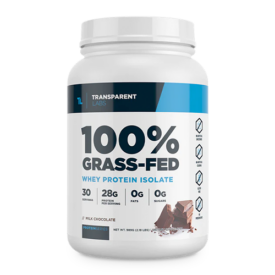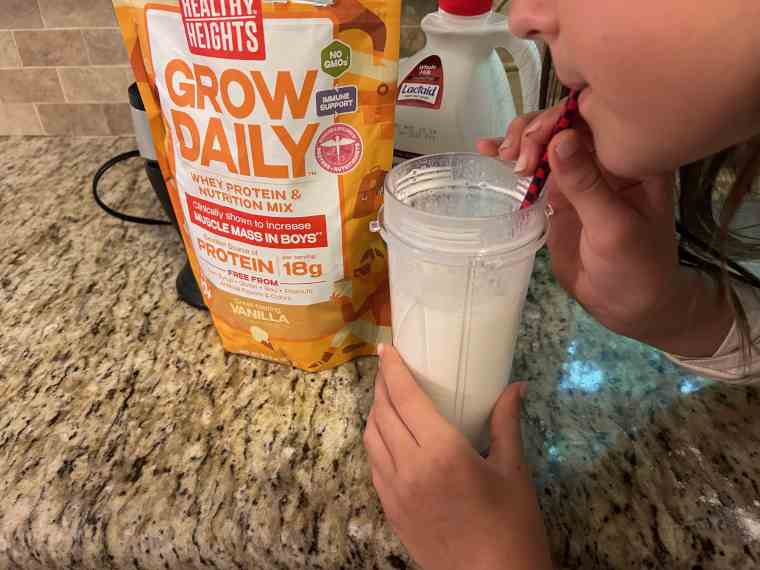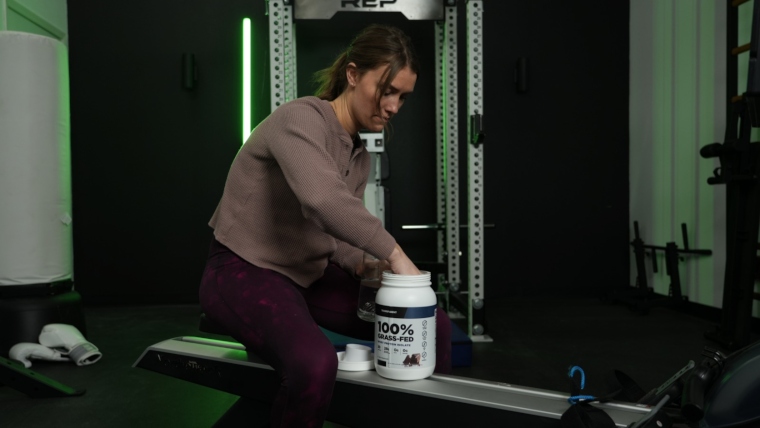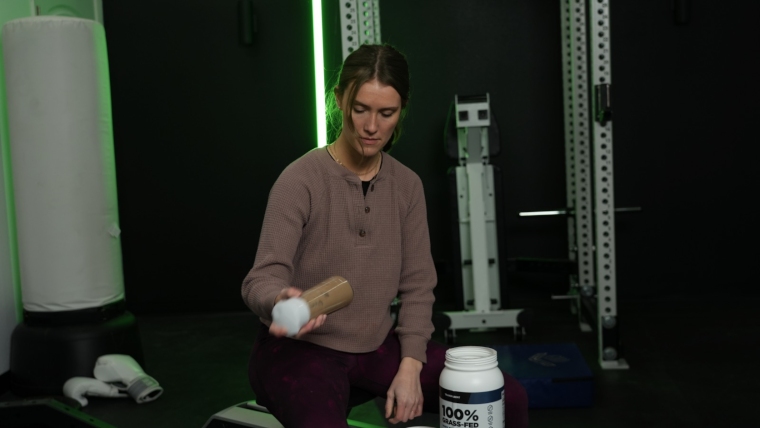Protein intake is a big deal in the food and supplement industry these days. Many foods and products are marketed as high-protein (including some of the best protein powders) to help with things from weight management to athletic performance, especially in adults. What about the best protein powders for kids, though?
Whether you have a picky eater, a kid with allergies, or want to promote weight gain in a child with less-than-optimal growth, protein powders for kids can fit the bill. We’ve rounded up five of the best protein powders for kids and will provide detailed reviews speaking to their formula, price, flavor, and other important factors.
The 5 Best Protein Powders for Kids of 2024
- The Best Protein Powder for Kids Overall: Nurished Kids Mighty Milk
- Best Protein Powder for Kid Athletes: Transparent Labs Whey Protein Isolate
- Best Protein Powder for Kids Weight Gain: Healthy Heights Grow Daily
- Best Tasting Protein Powder for Kids: Kate Farms Pediatric Standard
- Best Protein Powder for Picky Eaters: Drink Wholesome Protein Powder
Editor’s note: The content on BarBend is meant to be informative in nature, but it should not be taken as medical advice. The opinions and articles on this site are not intended for use as diagnosis, prevention, and/or treatment of health problems. It’s always a good idea to talk to your doctor before beginning a new fitness, nutritional, and/or supplement routine. Individual needs for vitamins and minerals will vary.
How We Tested and Chose the Best Protein Powder for Kids
Our team of dietitians, personal trainers, and other experts in the health and wellness field looked at over 110 protein powders before narrowing it down to the top five for kids. While this list includes favorites from our testing team, not all of them will be a great fit for every kid, so keep your child’s health and nutrition needs in mind as you navigate the options.
Our supplement testing methodology ensures we rule out products with potentially harmful ingredients while focusing on the factors that matter, like taste, solubility, and other factors. That means a member of our team (or the kids in their life, in this instance) has tested each product in this lineup!
Some of the most crucial factors we consider are:
- Formula: The ingredients list is one of the first things we look at when choosing the best protein powder for kids. We consider the protein source, protein content, sweeteners used, and whether or not there are additives in the formula.
- Flavor: Our product testers included kids, not just adults! Given the feedback from our kid testers, we provide flavor scores out of a max score of five.
- Sugar content: One in three kids in the U.S. eats more added sugar than the recommended amount. (1) We consider the added sugar content of the different formulations of kids’ protein powders.
- Solubility: How easily protein powder dissolves into liquid plays a big role in the overall texture of the end product. We’re aiming for high solubility scores out of a maximum score of five, which indicates minimal grit.
- Allergies and intolerances: Food allergies and intolerances (like lactose intolerance) are an issue for many kids. We made sure to include plant-based protein to address dairy-free diets and other dietary restrictions.
The Best Protein Powder for Kids Overall: Nurished Kids Mighty Milk
Help your kids get the nutrition they need with this gluten-free, third-party, non-GMO, 100-percent grass-fed protein. Each serving provides 2 billion probiotics, 9 grams of protein, 18 vitamins and minerals, and only 3 grams of sugar.
Specs
- Cost per serving: $1.87 using two-scoop serving; $0.93 using one-scoop serving
- Protein source: Whey protein concentrate
- Flavors: Chocolate, Strawberry, Cookies & Cream, Vanilla
- Added sugars: 2g per scoop
- Sweetener: Cane sugar, monk fruit sweetener
- Protein content: 4-5g per scoop
- Third-party tested? Yes
We chose Nurished Kids Mighty Milk as the best protein powder for kids overall and had a LOT of firsthand experience using it — both kids and their caregivers! Certified personal trainer and BarBend editorial team member Kate Meier weighs in on the experience of using the chocolate flavor: “I tasted this and thought it was great. It isn’t as good as the best-tasting protein powders, but I think many kids would like this taste, or you could easily put it in a smoothie.”
Meier has some thoughts on why her kids weren’t as over the moon with the flavor as she was: “My two kids are picky — they both tried Nurished, and they both agreed that it was ‘OK.’ They also rarely have anything with sugar alcohol/artificial sweetener, which may have thrown them.”
That doesn’t mean it wasn’t well received by other kid testers, though! Meier added, “ I gave this bag to one of the women on my weightlifting team, who made it for her kids. They also rated the taste a 4 out of 5 and said they liked it best when mixed with fruit/yogurt in a smoothie.” Another one of Meier’s friends says “…she would definitely buy it again because she likes baking with it. She said her overall experience with it was a 5/5.”
In terms of solubility, it gets a 4.5 out of 5 from Meier: “We mixed it in just a blender cup with milk, and it had those small flecks you sometimes see when you shake up protein with milk, but you can’t really notice the texture when drinking. [My friend] used it for cooking and said it’s GREAT for that.”
As a dietitian, I like that the protein content is a bit more modest at 4 to 5 grams per scoop. Kids often don’t need as much protein as adults because they weigh less (protein needs are estimated based on body weight), so this is a bit more fitting amount of protein for a kids’ protein powder.
Best Protein Powder for Kid Athletes: Transparent Labs Whey Protein Isolate

With 8 different flavors and 28 grams of whey protein from hormone-free, grass-fed cows, Transparent Labs Whey Protein Isolate is an excellent way to hit your protein macros.
Specs
- Cost per serving: $2
- Protein source: Whey protein isolate
- Flavors: Milk Chocolate, French Vanilla, Chocolate Peanut Butter, Dark Chocolate, Unflavored, Strawberry Milkshake, Cinnamon French Toast, Mocha, Vanilla Peanut Butter, Oatmeal Chocolate Chip Cookie, Mint Chocolate Chip, Blueberry Pancakes
- Added sugars: 0g per serving
- Sweetener: Stevia
- Protein content: 28g per serving (one scoop)
- Third-party tested? Yes
Transparent Labs Whey Protein Isolate is the best protein powder for kid athletes because it’s the highest in protein per serving in our lineup. With a whopping 28 grams of protein per scoop and more than enough flavors to choose from, Transparent Labs Whey Protein Isolate can help support the protein needs of active kids to help support healthy muscle mass (some of the best protein powders for muscle gain use whey protein!)
In terms of the formulation, registered dietitian Chelsea Rae Bourgeois has this to say: “I love that Transparent Labs Whey Protein Isolate is free from artificial sweeteners, food dyes, and preservatives. You get 28 grams of high-quality protein without any unnecessary fluff. Plus, it’s tested by a third-party lab, and the certificates of analysis are available right on the website.”
Bourgeois adds: “Transparent Labs Whey Protein Isolate packs in the protein without any unnecessary fluff. Each scoop provides 28 grams of protein and minimal amounts of carbs and fat.” Furthermore, Bourgeois notes, “While the formulation varies slightly between flavors, the core formula remains the same. Based on the amount of whey protein, Himalayan rock salt, stevia, and natural flavors, Transparent Labs Whey Protein Isolate scores a 4.5 out of 5 for its formulation.”
Our expert product tester was a big fan of the flavor, saying, “I tried Peppermint Hot Chocolate, and it tasted like a cold winter morning. Exactly what you’d want — just add some marshmallows and whipped cream, and you’ve got yourself what it advertises. A definite 5 out of 5 on flavor.”
Another product tester was pleased with the texture and flavor of Transparent Labs Whey Protein Isolate: “It’s not exactly as frothy as real hot chocolate, but it’s still much richer than I’d expect.” This tester was a big fan of their experience using this protein-packed powder, raving, “I don’t say this to all the protein powders on the block — really — but this is one of the best protein powders I’ve ever tried out. No bloating to speak of, it tastes great, and I feel full.”
Best Protein Powder for Kids Weight Gain: Healthy Heights Grow Daily 10+
This protein powder and nutrition mix was developed by doctors and nutritionists specifically for athletes and growing boys. Each serving provides 18 grams of carbs, 10 grams of fat, and 31 grams of carbohydrates to help keep kids fueled and growing.
Specs
- Cost per serving: $3.70
- Protein source: Whey protein concentrate
- Flavors: Chocolate, Vanilla, Plain
- Added sugars: 4g per serving
- Sweetener: Cane sugar, stevia
- Protein content: 18g per 2 scoops (one serving)
- Third-party tested? No
Healthy Heights Grow Daily 10+ is a good kids’ protein powder for weight gain because of the added fat (10 grams per serving) and generous protein content. Fat provides the most calories per gram (9 calories per gram compared to 4 calories per gram for protein and carbohydrates), which is what makes this protein powder higher in calories.
Along with the generous amount of protein per serving, I like that it contains added iron, calcium, and vitamin D — all important nutrients for growing kids.
One thing I don’t love is maltodextrin as the second ingredient (it’s a refined corn-based filler and sweetener). However, it’s considered a safe food additive and like other refined ingredients, it should be eaten in moderation. Another thing to note is that the manufacturer designed this formula around the nutrition needs of teenage boys, though girls and kids of any gender can surely still use it as a protein supplement.
Certified personal trainer and BarBend editorial team member Kate Meier recruited her active son and his two friends (ages 12 to 13) to try the vanilla flavor. All of the boys play sports and are no strangers to protein powder. “I mixed this with milk in a blender cup and gave the boys each a glass. Two of the three boys LOVED this taste. They both took pictures of the bag and asked their parents if they would buy it for them.”
Meier adds, “My son, who loves vanilla Muscle Milk, said this tasted good, but he prefers Muscle Milk (I can’t blame him; MM is the shit). One of the boys took the bag home with him and is currently tearing his way through it.” Overall, Meier gave Grow Daily a score of 4.5 out of 5 for taste.
Regarding solubility, Meier found Grow Daily easy to work with and gave it a 4.5 out of 5 for solubility: “No issues mixing this in a blender bottle with water or with milk! It gets pretty frothy, even in a blender cup. The boys didn’t seem to care.”
Best Tasting Protein Powder for Kids: Kate Farms Pediatric Standard
These plant-based shakes provide 12 grams of protein, 27 vitamins and minerals, and are made without common allergens such as milk, wheat, soy, sesame, peanuts, tree nuts, egg, fish, and shellfish.
Specs
- Cost per serving: $4.25 per carton
- Protein source: Pea protein
- Flavors: Chocolate, Vanilla
- Added sugars: Not specified on the label; contains 9g of sugars per serving
- Sweetener: Brown rice syrup solids, agave syrup
- Protein content: 12g per 250ml carton
- Third-party tested? Not specified
OK, so Kate Farms Pediatric Standard technically isn’t a protein powder, it’s a premade shake – but that adds an element of convenience, doesn’t it? We chose it as the best-tasting protein powder our tester — who tried it with both of her kids — said it ranked a solid 4 out of 5 on taste with all three of them. That kind of agreement can be hard to come by in this arena!
As a dietitian, I appreciate the addition of fruit and veggie powders and prebiotics, which are forms of fiber that help promote the growth of healthy bacteria in the gut. There are 5 grams of fiber in each carton, which provides over half of the daily recommended amount of fiber for a 40-pound child. (3)
Keep in mind that there is added fat in this formula (12 grams per carton), which raises the calorie content. While this might not be a problem for many kids, it should be taken into consideration since it may be more filling compared to other protein powders (which might impact kids’ appetites for regular meals). (Low-calorie, high-protein foods can be a good solution if you’re watching the calorie intake of your child for any reason.)
Kate Farms Pediatric Standard also can’t be beaten on a convenience scale. According to certified personal trainer and BarBend editorial team member Kate Meier, the fact that this is a pre-made shake makes it a winner. “This is so fantastic for my son, who loves to wake up as late as possible and eat breakfast in the car on the way to school/practice/anything.”
Best Protein Powder for Picky Eaters: Drink Wholesome Protein Powder (Egg white version)
This easy-to-digest protein powder provides 15 grams of protein and uses only four simple ingredients: egg whites, coconut, maple sugar, and vanilla. There are no fake flavors, no fake sweeteners, just real foods.
Specs
- Cost per serving: $2.86
- Protein source: Egg white
- Flavors: Chocolate, Vanilla, Unflavored
- Added sugars: 0g
- Sweetener: Monk fruit or maple sugar (we tested the monk fruit version)
- Protein content: 15g per serving (3 tbsp.)
- Third-party tested? Yes
Unlike some of the best whey protein powders which are milk-based, Drink Wholesome uses egg whites as its protein source. It’s one of the best protein powders for picky eaters because it got a 4 out of 5 for taste from one of our expert testers who says, “We tried the vanilla. It’s not bad at all! My kids LOVE drinking milk and they felt like this just made their milk a little more sweet and they really enjoyed that. The only thing I will say is that it does have coconut in it so if you’re not a fan of coconut you will not like this at all.”
I like that Drink Wholesome is milk-free, considering milk allergies are most prevalent in children ages 6 to 10. (4) While it’s a good option for kids with milk and soy allergies, it does contain egg as well as coconut (a tree nut), which are among the top nine food allergens. If you want to avoid coconut (either for allergies or taste preferences) then you can go for the unflavored version which is coconut-free. (For egg allergies, they offer a collagen version as well!)
Our product tester has more helpful feedback on the solubility of Drink Wholesome protein powder from their personal use of the product: “In a blender, this mixes very nicely. In a shaker cup… ehhh… you could feel the protein in your mouth more with a shaker bottle. Put it in pancakes for your kiddos for some protein pancakes and they’d have zero idea it was there! It scores a 4 out of 5 for taste.”
To summarize, our product tester has this to say: “Overall this is a good protein drink. I really like how easy it is on my stomach!” And when the kids really like it, too, it’s a win-win all around.
Benefits of Protein Powder for Kids
While protein deficiency is rare in industrialized countries, it doesn’t hurt to make sure your kid is getting enough protein through protein-rich foods — including tasty options for extra protein like these powers. This is especially true if you have an active kid, or one who is involved in sports. For young athletes, it’s recommended that 15 to 20% of calories come from protein. (5) (You can also consider protein vs. BCAA supplements to provide essential amino acids which help build protein.)

In addition to eating whole foods, protein powders can help ensure kids are getting enough protein to help perform their best and meet their daily protein intake needs. At the very least, protein powders can help make kids feel full, which means less hunger-induced mood swings or tantrums. (I add protein powder to my kids’ fruit smoothies to help even out the balance of carb to protein! It helps them get a balanced diet with their essential vitamins, sans the artificial flavors!)
Here are a few of the benefits of protein powder for kids:
- Promotes muscle growth: Studies suggest that higher protein intake in kids can help promote healthy muscle and bone mass. For picky eaters, protein intake promotes positive changes in height and weight. (6)
- Adds calories: Protein powder not only provides protein, but some formulas have added fat to promote weight gain. This can be especially helpful for picky eaters or kids with growth concerns.
- Added nutrients: Some kids’ protein powders contain added nutrients like calcium and vitamin D. Some kids are deficient in these nutrients, and a fortified protein supplement containing these nutrients can help prevent deficiency. (7)
How Much Does Protein Powder for Kids Cost?
The price range for the best protein powder for kids ranges from $1.87 to $4.25 per serving. Some brands offer two serving sizes on their nutrition facts label (one vs. two scoops), so the range we listed is for one scoop or the standard serving size.

| Best Protein Powder for Kids Overall | Nurished Kids Mighty Milk | $1.87 using two-scoop serving; $0.93 using one-scoop serving |
| Best Protein Powder for Kid Athletes | Transparent Labs Whey Protein Isolate | $2 |
| Best Protein Powder for Kids Weight Gain | Healthy Heights Grow Daily 10+ | $3.70 |
| Best Tasting Protein Powder for Kids | Kate Farms Pediatric Standard | $4.25 (per carton) |
| Best Protein Powder for Picky Eaters | Drink Wholesome Protein Powder | $2.86 |
What to Consider Before Buying Protein Powder for Kids
There are several factors to consider as you choose which protein powder is the best for your kid (or the kid in your life.) If you’re not sure what to aim for regarding protein intake (for a child or yourself), you can use handy tools like our protein intake calculator to get the ball rolling. It’s never a bad idea to reach out to your child’s pediatrician if you have concerns about your child’s diet, though.
Protein Source
Are some protein sources better than others? It depends on your child’s needs. Some of the best protein powders rely on whey as the protein source, but if a child has a milk allergy or follows a plant-based diet, then whey protein powders aren’t the right fit. Some of the best vegan protein powders rely on protein sources like peas, rice, and soy.
According to registered dietitian Austin Bou, RD, CDCES, ACE-CPT, whey is (aside from potential stomach issues) a great choice. “Whey is a fast-digesting milk protein that offers the most benefits when consumed post-workout.”
Plant-based sources are also solid, Bou explains. “Plant-based protein supplements are good for those that are vegan, vegetarian, or have a dairy sensitivity. Soy and pea protein isolates have the highest bioavailability amongst plant proteins.”
Protein Content
The protein content of the best protein powder for kids ranges from 4 to 28 grams of protein per serving. If a child is already eating a variety of high-protein foods, you don’t necessarily need the highest-protein powder and could get by with lower protein amounts per serving. If you have a child who needs more protein for any reason, then the protein powders with more protein per serving will be a better fit.
Sweeteners
The American Academy of Pediatrics recommends that kids under the age of two don’t consume any added sugar, and kids over the age of two consume less than 25 grams of added sugar each day. To help minimize added sugar intake, many kids’ protein powders rely on natural sugar substitutes like monk fruit sweetener or stevia, while others contain added sugar in the form of cane sugar. Some kids might not like the taste of sugar alternatives (especially if they haven’t had them before,) so that is an important factor when choosing a kids’ protein powder.
Protein Powder for Kids FAQs
Which protein powder is best for kids?
Nurished Kids Mighty Milk tops our list of the best protein powders for kids. It utilizes whey protein as its protein source and has added nutrients and probiotics. The protein content is appropriately geared towards kids’ protein needs at 4 to 5 grams of protein per scoop, and it’s low in added sugar. It’s third-party tested, too!
Is protein powder OK for kids?
While most kids don’t need protein powder to meet their protein needs, it’s generally considered safe for kids to use. It’s ideal for kids to get protein from whole food sources (meat, eggs, nuts, beans, etc.), but using protein powder is typically OK and can even be beneficial in certain health situations. (If your child has a health condition that warrants limiting protein, then you should speak with your child’s healthcare provider before adding protein powder to their diet.)
At what age should you start taking protein powder?
There isn’t a definitive age that is suggested to start taking protein powder. Kids have lower protein needs than adults, so protein powder is not usually necessary to meet protein needs. If you want to introduce protein powder to a child younger than two, you should speak with the child’s healthcare provider first.
What are the best ingredients for kids' protein shakes?
Some of the best ingredients for kids’ protein shakes are whey protein, pea protein, collagen, and egg white (avoid egg white if there are egg allergies present, though.) It’s also important to consider what the best kids’ protein shakes DON’T contain — added fillers and preservatives.
Kids’ protein shakes shouldn’t be high in added sugar, and ideally, they won’t contain artificial sweeteners. Monk fruit sweetener and stevia are two natural sugar substitutes that are good choices for kids’ protein shakes and powders.
References
- Park S;Zhao L;Lee SH; Hamner HC; Moore LV; Galuska DA; Blanck HM; (2023). Children and adolescents in the United States with usual high added sugars intake: Characteristics, eating occasions, and top sources, 2015-2018. Nutrients. https://pubmed.ncbi.nlm.nih.gov/36678144/
- Nutritional Growth Solutions. (No date.) Healthy Heights Academic Summary Grow Daily Boys 10+. https://cdn.shopify.com/s/files/1/2965/9382/files/HH_Academic_Summary_Grow_Daily_Boys_10P_2.pdf?v=1637728421
- Williams, C.L. (1995). Importance of dietary fiber in childhood. Journal of the American Dietetic Association. https://pubmed.ncbi.nlm.nih.gov/7560686/
- Warren CM; Jhaveri S; Warrier MR; Smith B; Gupta RS; (2013). The epidemiology of milk allergy in US children. Annals of allergy, asthma & immunology : official publication of the American College of Allergy, Asthma, & Immunology. https://pubmed.ncbi.nlm.nih.gov/23622009/
- Smith, J. W., Holmes, M. E., & McAllister, M. J. (2015). Nutritional considerations for performance in young athletes. Journal of sports medicine (Hindawi Publishing Corporation). https://www.ncbi.nlm.nih.gov/pmc/articles/PMC4590906/
- Garcia-Iborra, M., Castanys-Munoz, E., Oliveros, E., & Ramirez, M. (2023, March 30). Optimal protein intake in healthy children and adolescents: Evaluating current evidence. Nutrients. https://www.ncbi.nlm.nih.gov/pmc/articles/PMC10097334/
- Cosenza L;Pezzella V;Nocerino R;Di Costanzo M;Coruzzo A;Passariello A;Leone L;Savoia M;Del Puente A;Esposito A;Terrin G;Berni Canani R; (2013). Calcium and vitamin D intakes in children: A randomized controlled trial. BMC pediatrics. https://pubmed.ncbi.nlm.nih.gov/23702146/
